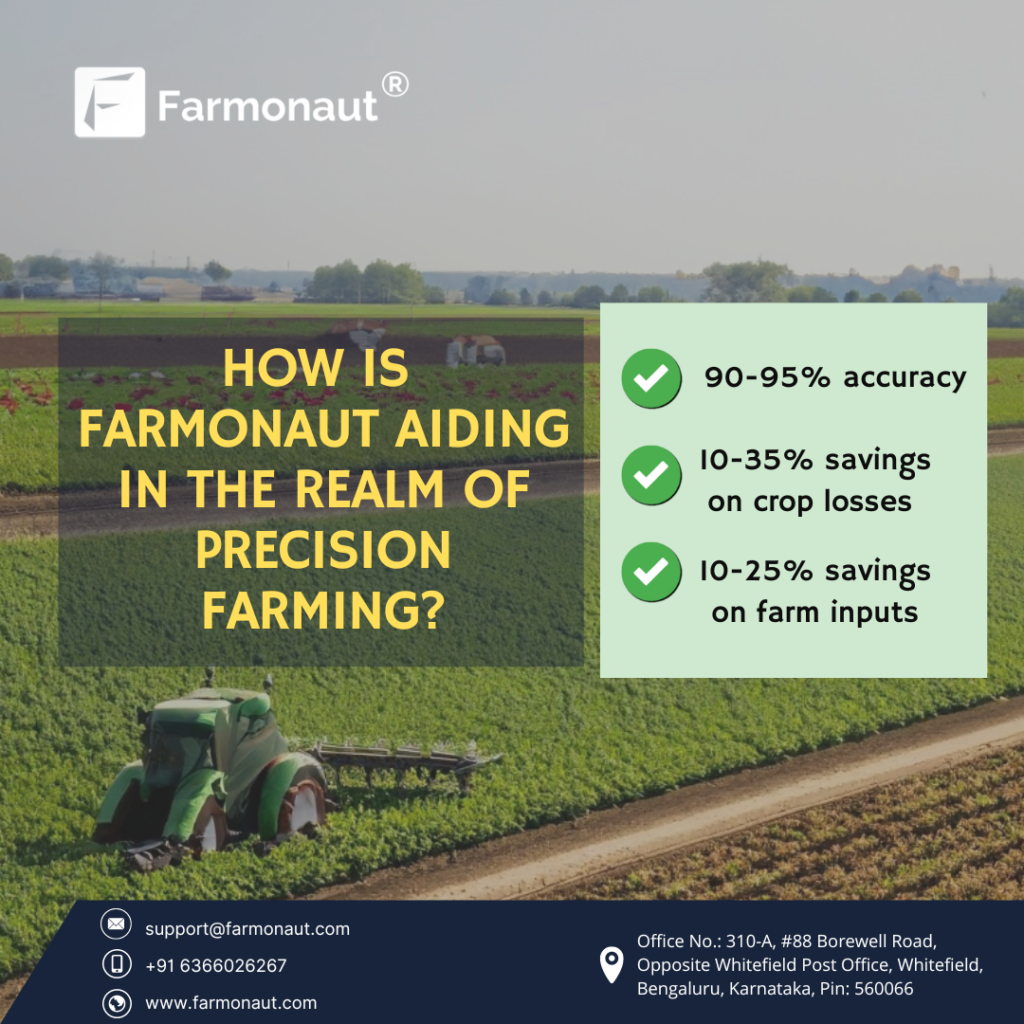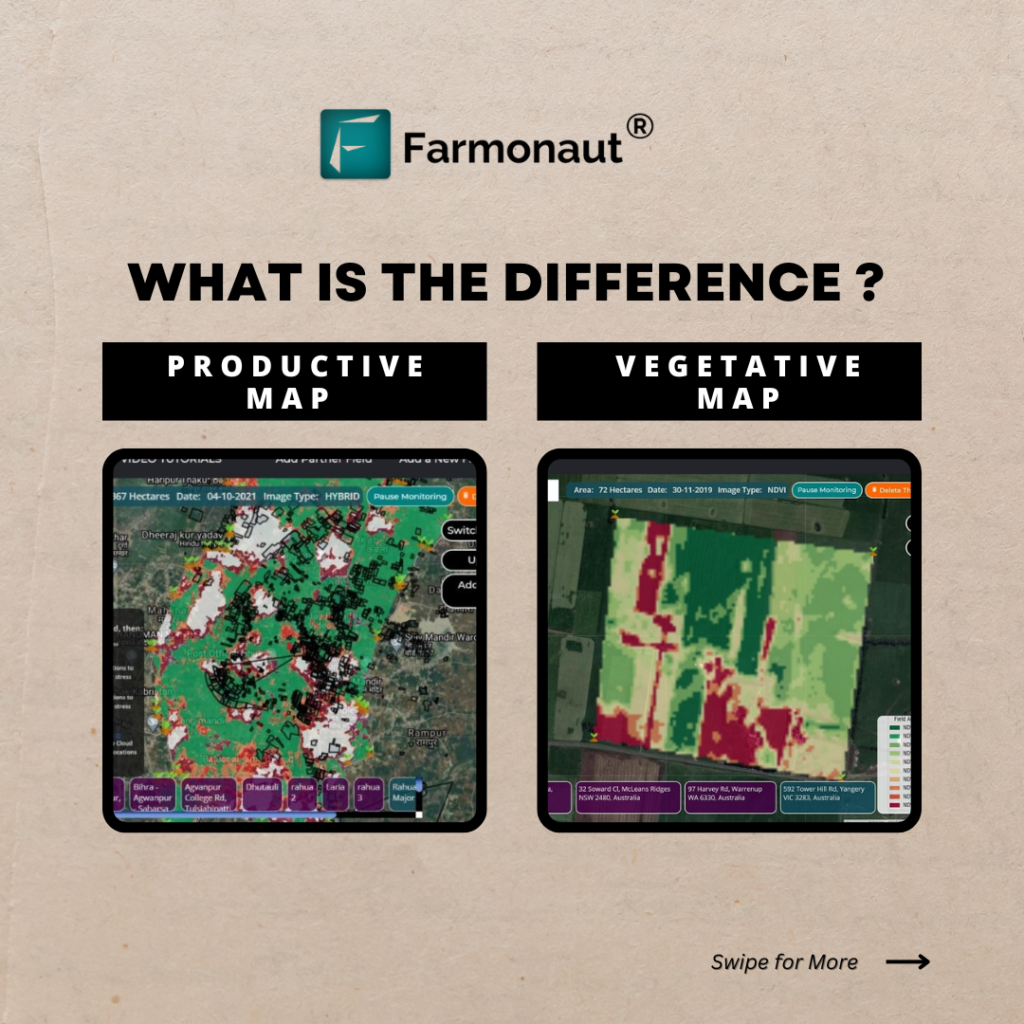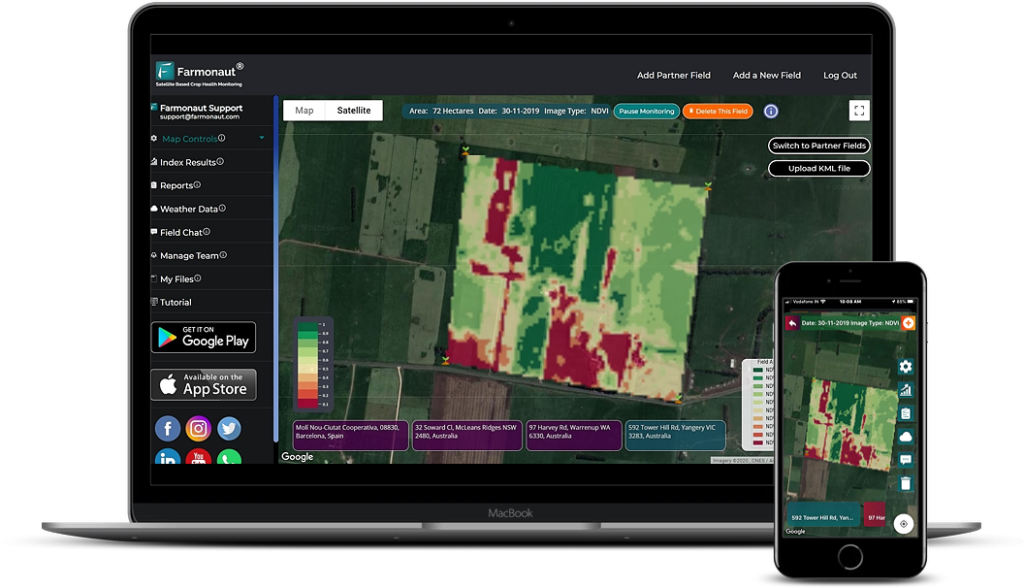Black Aphids: Identifying, Controlling, and Protecting Your Crops

At Farmonaut, we understand the challenges farmers face when dealing with pests like black aphids. These tiny insects can wreak havoc on crops, causing significant damage and yield losses if left unchecked. In this comprehensive guide, we’ll explore everything you need to know about black aphids, from identification to control methods, and how our advanced satellite-based farm management solutions can help you protect your crops more effectively.
Understanding Black Aphids
Black aphids, also known as blackfly or bean aphids, are small, soft-bodied insects that feed on plant sap. They can be found on a wide variety of crops, including beans, peas, lettuce, and various fruit trees. These pests are particularly problematic because they reproduce quickly and can transmit plant viruses.
Identifying Black Aphids
Recognizing black aphids is crucial for effective pest management. Here are some key characteristics to look out for:
- Appearance: Black aphids are typically 1-2mm long and have a pear-shaped body.
- Color: Despite their name, black aphids can range from dark brown to black.
- Antennae: They have long antennae and two tube-like structures called cornicles on their rear end.
- Colonies: Black aphids often cluster in large groups on plant stems, leaves, and buds.

The above image showcases typical black aphids images, helping you identify these pests in your fields. It’s important to note that while these images of black aphids provide a good reference, infestations can vary in appearance depending on the specific crop and environmental conditions.
The Impact of Black Aphids on Crops
Black aphids can cause significant damage to crops in several ways:
- Sap Feeding: By sucking sap from plants, aphids weaken the host and reduce its ability to grow and produce.
- Honeydew Production: As they feed, aphids excrete a sticky substance called honeydew, which can lead to the growth of sooty mold on leaves.
- Virus Transmission: Black aphids are known vectors for various plant viruses, potentially spreading diseases throughout your crops.
- Leaf Distortion: Heavy infestations can cause leaves to curl, wilt, or become deformed.
- Stunted Growth: Affected plants may exhibit reduced growth rates and overall vigor.
Monitoring for Black Aphids with Farmonaut
At Farmonaut, we’ve developed cutting-edge satellite-based monitoring systems that can help you detect potential aphid infestations early. Our technology offers several advantages over traditional monitoring methods:
| Feature | Farmonaut Satellite System | Drone-based Monitoring | IoT-based Monitoring |
|---|---|---|---|
| Coverage Area | Large-scale (entire farms) | Limited by flight time and regulations | Localized (sensor placement) |
| Frequency of Updates | Daily to weekly | As needed, but labor-intensive | Real-time, but limited scope |
| Cost-effectiveness | High (no on-site equipment needed) | Moderate (equipment and operator costs) | Variable (depends on sensor network size) |
| Data Analysis | AI-powered, comprehensive | Requires manual interpretation | Limited to sensor data |
| Weather Independence | Less affected by local weather | Highly dependent on weather conditions | Generally weather-independent |
Our satellite-based system provides a comprehensive view of your entire farm, allowing you to spot potential problem areas quickly. By analyzing vegetation health indices and other key metrics, we can help you identify signs of stress that may indicate an aphid infestation.
To get started with our advanced monitoring tools, visit Farmonaut’s App or explore our API services for integration with your existing farm management systems.
Integrated Pest Management for Black Aphids
Effectively controlling black aphids requires an integrated approach. Here are some strategies we recommend:
1. Cultural Control
- Crop Rotation: Rotating crops can disrupt aphid life cycles and reduce population buildup.
- Intercropping: Planting companion crops that repel aphids or attract beneficial insects can help manage populations.
- Proper Plant Spacing: Adequate spacing improves air circulation and makes plants less hospitable to aphids.
- Weed Management: Many weeds can host aphids, so keeping your fields clean is crucial.
2. Biological Control
Encouraging natural predators can be an effective way to keep black aphid populations in check. Some beneficial insects include:
- Ladybugs
- Lacewings
- Parasitic wasps
- Hoverflies
Our satellite monitoring can help you identify areas where biodiversity might be lacking, allowing you to take targeted action to improve the presence of these beneficial insects.
3. Chemical Control
While we always recommend starting with cultural and biological control methods, sometimes chemical interventions may be necessary. When using pesticides:
- Choose selective insecticides that target aphids while minimizing harm to beneficial insects.
- Follow all label instructions carefully.
- Rotate between different classes of insecticides to prevent resistance.
- Use our satellite monitoring to apply pesticides only where and when needed, reducing overall chemical use.
4. Physical Control
For smaller-scale operations or in greenhouses, physical control methods can be effective:
- Water Sprays: A strong jet of water can dislodge aphids from plants.
- Sticky Traps: Yellow sticky traps can capture flying aphids.
- Pruning: Removing heavily infested plant parts can help control the spread.
Leveraging Farmonaut’s Technology for Black Aphid Management
Our advanced satellite-based farm management solutions offer several tools to help you combat black aphid infestations more effectively:
1. Early Detection
Our satellite imagery can detect subtle changes in crop health before they’re visible to the naked eye. This early warning system allows you to investigate potential aphid hotspots before the infestation spreads.
2. Precision Application
By providing detailed maps of your fields, our technology enables you to apply control measures precisely where they’re needed most. This targeted approach can save time, reduce costs, and minimize environmental impact.
3. Monitoring Treatment Efficacy
After applying control measures, our continuous monitoring allows you to track the effectiveness of your interventions. You can quickly assess whether additional action is needed or if your treatments are working as intended.
4. Historical Analysis
Our platform stores historical data, allowing you to analyze patterns of aphid infestations over time. This information can help you predict future outbreaks and plan preventive measures accordingly.
5. Integration with Weather Data
Black aphid populations are influenced by weather conditions. Our system integrates real-time weather data with crop health information, helping you understand how environmental factors might be affecting aphid populations in your fields.
To explore how our technology can revolutionize your pest management strategy, download our app for Android or iOS.
Case Studies: Success Stories in Black Aphid Management
While we don’t have specific case studies to share, we’ve seen numerous success stories from farmers using our technology to manage black aphid infestations. Here are some general examples of how satellite-based monitoring has helped:
- A vegetable farmer in California reduced pesticide use by 30% after implementing our precision agriculture techniques for aphid control.
- An organic fruit orchard in Europe increased their beneficial insect population by 40% after using our data to optimize their intercropping strategy.
- A large-scale soybean operation in Brazil saved an estimated 15% on pest control costs by detecting and treating aphid hotspots early.
The Future of Black Aphid Control
As technology continues to advance, we at Farmonaut are constantly innovating to provide even better solutions for pest management. Some exciting developments on the horizon include:
- AI-Powered Predictive Models: We’re developing machine learning algorithms that can predict aphid outbreaks based on historical data, weather patterns, and crop health indicators.
- Integration with Automated Pest Control Systems: In the future, our satellite data could directly inform automated spraying systems, further optimizing pesticide use.
- Enhanced Spectral Analysis: Advances in satellite technology may soon allow us to detect the chemical signatures of aphid infestations, enabling even earlier intervention.
Conclusion
Managing black aphids effectively requires a combination of vigilance, integrated pest management strategies, and advanced technology. At Farmonaut, we’re committed to providing farmers with the tools they need to protect their crops while minimizing environmental impact and maximizing yields.
By leveraging our satellite-based monitoring systems, you can stay one step ahead of black aphid infestations, making informed decisions about when and where to intervene. Remember, successful aphid management is not just about reacting to infestations, but about creating a holistic farm ecosystem that naturally keeps pest populations in check.
We invite you to explore how Farmonaut can transform your approach to pest management and overall farm productivity. Visit our API documentation to learn more about integrating our powerful tools into your existing farm management systems.
Ready to Take Control of Black Aphids?
Subscribe to Farmonaut today and start leveraging the power of satellite technology to protect your crops:
Frequently Asked Questions (FAQ)
Q: How quickly can black aphids damage my crops?
A: Black aphids can reproduce rapidly under favorable conditions, potentially causing noticeable damage within a week of infestation. Early detection and intervention are crucial.
Q: Can Farmonaut’s satellite imagery detect individual aphids?
A: While our technology can’t see individual insects, it can detect the stress signals plants emit when under aphid attack, often before visible symptoms appear.
Q: How often should I monitor my fields for black aphids?
A: With Farmonaut’s satellite monitoring, you can receive updates as frequently as daily, allowing for continuous vigilance without the need for time-consuming field walks.
Q: Are there any natural repellents for black aphids?
A: Yes, plants like marigolds, nasturtiums, and alliums can help repel aphids. Our system can help you plan and monitor the effectiveness of these companion planting strategies.
Q: How does weather affect black aphid populations?
A: Warm, dry conditions generally favor aphid reproduction. Our integrated weather data can help you anticipate potential population spikes based on local conditions.
Q: Can black aphids develop resistance to pesticides?
A: Yes, aphids can develop resistance if the same pesticides are used repeatedly. Our historical data analysis can help you implement effective pesticide rotation strategies.
Q: How does Farmonaut’s technology compare to traditional scouting methods?
A: While traditional scouting is still valuable, our satellite technology offers broader coverage, more frequent updates, and the ability to detect issues earlier than the human eye, complementing and enhancing traditional methods.
Q: Is Farmonaut’s system suitable for small-scale farmers?
A: Absolutely! We offer scalable solutions that can benefit farms of all sizes, from small family operations to large commercial enterprises.
Q: How can I integrate Farmonaut’s data with my existing farm management software?
A: Our API services allow for seamless integration with many popular farm management platforms. Check our API documentation for details.
Q: What other pests can Farmonaut’s technology help me manage?
A: While this article focuses on black aphids, our system can help detect stress caused by various pests and diseases, including other aphid species, caterpillars, fungal infections, and more.
By leveraging Farmonaut’s advanced satellite technology and comprehensive farm management solutions, you can stay ahead of black aphid infestations and other crop threats. Our system provides you with the insights needed to make informed decisions, optimize your pest management strategies, and ultimately protect your yields and profitability.
Remember, effective pest management is an ongoing process. With Farmonaut by your side, you’ll have the tools and support needed to tackle black aphids and other agricultural challenges head-on. Subscribe today and take the first step towards more efficient, sustainable, and profitable farming!












